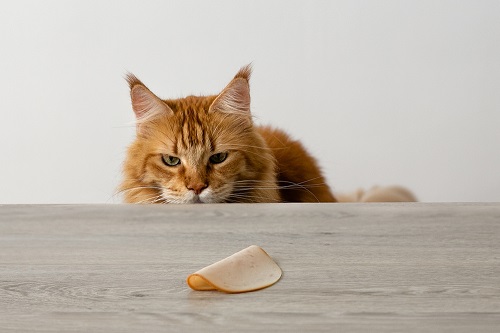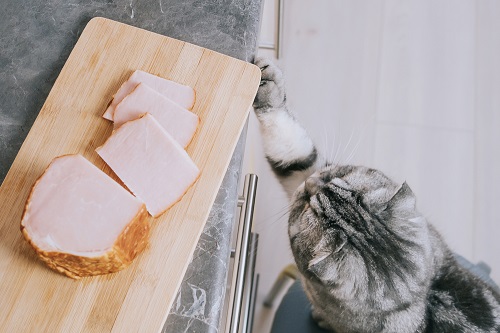Cats and Ham? Find out if it is safe for your pet to indulge in this meaty delight in our article: Can Cats Eat Ham?
Ham is a popular food item that many humans enjoy, and it is natural to wonder if your feline friend can partake in the deliciousness too. While cats may be curious about the aroma and taste of ham, it is important to consider whether it is safe for them to eat. This article will explore the question – Can Cats Eat Ham?
Can Cats Eat Honey? Find out here
What Is Ham?

Ham is a type of meat that comes from the hind leg of a pig. It is made by preserving and flavoring pork through curing, smoking, or both. Ham can be sliced and used as a food item – in sandwich fillings and salads or added to various dishes for flavor.
Can Cats Eat Ham?
So, Can Cats Eat Ham? Well, they can, but it is not recommended as a regular part of their diet. Ham can cause a lot of health problems in felines. So, it is best to avoid feeding it to your cat.
Is Ham Toxic For Cats?

Ham is not necessarily toxic to cats, but it is not recommended for them as it does more harm than benefit. The components of ham can be toxic for cats.
Does Ham Contain Any Nutritional Value For Cats?
No, ham does not contain any nutritional value for cats. Cats are obligate carnivores and need a diet that is high in animal-based proteins and essential fatty acids. Ham does not provide the nutrients cats need to stay healthy.
How Much Ham Is Bad For A Cat?
It is recommended that treats should only make up a small part of a cat’s diet, no more than 10% of their daily calorie intake. The exact amount of treats a cat can have depends on their individual calorie needs, so it is best to consult a veterinarian to determine an appropriate amount for your cat. Additionally, it is important to choose healthy treats.
A slice of ham, approximately 16g, contains 0.6g of fats. An adult cat needs almost 5.5g of fats per day, most of which it gets from a balanced diet. So, if your pet has taken a bite of two of ham, it should be okay. However, avoid feeding it ham as a treat and look for other cat-friendly options.
Signs Of Ham Allergy In Cats
In case your cat is allergic to ham, it can show the following symptoms –
- Vomiting
- Diarrhea
- Itching or scratching excessively
- Red or inflamed skin
- Sneezing or coughing
- Difficulty breathing
- Swollen face or paws
- Loss of appetite
- Lethargy or weakness
What About Ham Bones?
It is not recommended to feed cats ham bones or any cooked bones as they can splinter and cause serious harm to their digestive system, including blockages, tears, or punctures. Additionally, they can also pose a choking hazard to cats. Therefore, it is best to avoid giving ham bones to cats and instead provide them with safe and appropriate treats and toys to chew on.
Options Other Than Hams
Cats can eat a variety of food items that provide nutritional benefits. Some options other than ham that cats can eat include:
The following are some protein sources for cats instead of ham:
- Cooked chicken
- Cooked turkey
- Fish
- Beef
Remember: All the food items mentioned here might not be suitable for every cat. Consult a veterinarian for more information, and do not forget – moderation is the key when it comes to felines.
A Few Concerns
- Ham is high in fat and sodium, which can cause digestive upset in cats, including vomiting and diarrhea.
- Ham is also high in purines, which can lead to the formation of uric acid crystals in cats, which can cause urinary tract problems.
Something Important!

- High-fat content in ham can cause pancreatitis in cats, an inflammation of the pancreas.
- The processed nature of ham can cause your cat to become overweight and lead to other dietary issues, such as diabetes.
- The high sodium content can also cause dehydration and other electrolyte imbalance issues.
Can Cats Eat Ham? Quick Takeaways!
- Cats can eat ham, but they should not.
- Ham is harmful to cats because of its high fat and sodium composition.
- Ham does not contain any nutritional value for cats and should not be made a part of their diet, even in the form of treats.
- Some cats may be allergic to ham and may show symptoms like gastrointestinal problems, skin problems, and lethargy.
- There are a wide variety of options of food items available for cats instead of ham, like honey, sweet potatoes, and cooked chicken.
- If your cat has consumed a bit of ham and is showing unusual behavior, consult a veterinarian immediately.



